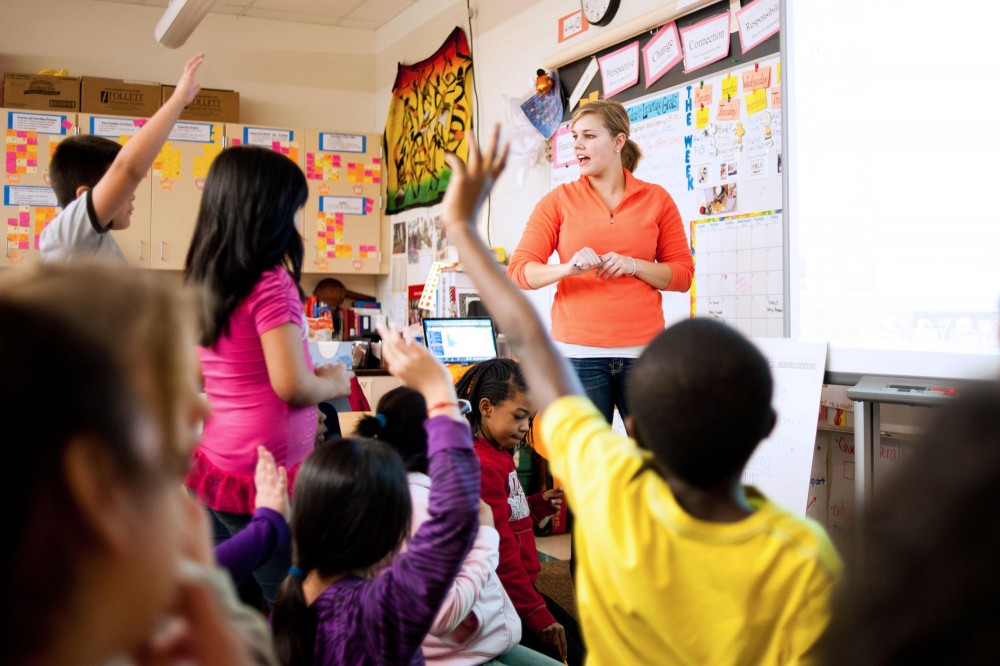A proposed bill in the state Legislature could drastically change how schools make staffing decisions in tough times by leveling the playing field for new teachers.
Currently, when a school district needs to layoff or discharge teachers, the district uses teacher seniority as the major factor. Teachers who have been with the school longer are often protected, while newer teachers are targets.
The new bill would allow districts to make staffing decisions based primarily on teacher evaluations rather than seniority alone.
âÄúIf you even want to call it a decision-making process,âÄù said Rep. Branden Petersen, R-Andover, the author of the bill. âÄúItâÄôs an arbitrary process to make such a critical decision about the future of a teacher.âÄù
Minnesota is one of 14 states that mandate that seniority be the deciding factor in layoff decisions, according to a 2010 report from the National Council on Teacher Quality.
This proposal is welcome news for new teachers, who are currently the first to go when a district must tighten its belt. Supporters say it will also raise teaching standards.
âÄúFor me, itâÄôs a good thing,âÄù said Amanda Borgardt, a graduate student in the elementary education initial licensure program at the University of Minnesota. It would âÄúallow you to be looked at and decided if youâÄôre teaching to your studentsâÄô needs.âÄù
The bill would also help retain good teachers, Petersen said. By basing discharge decisions on seniority, âÄúinevitably, you are going to layoff some teachers who shouldnâÄôt have been, and you are maybe going to keep some teachers who shouldnâÄôt be kept,âÄù he said.
Misty Sato, assistant professor of teacher development and science education at the University, said itâÄôs unclear how teachers would be evaluated under the new mandate.
âÄúOne of the really big issues theyâÄôre going to have to face really quickly is if you donâÄôt use seniority … to make decisions about layoffs or continued contracts, you have to use something else,âÄù Sato said.
Sato serves on a state task force for the Minnesota Department of Education âÄî the Teacher Evaluation Process Panel âÄî that is trying to answer that question.
The state Legislature put forward a general teacher evaluation framework last year for the panel to work with, Sato said. The panel plans to create an evaluation process by 2014.
The framework stated that 35 percent of the evaluation must be based on student achievement in the classroom and performance on standardized tests. The remaining 65 percent is balanced around the teacherâÄôs performance in the classroom, including principal and peer observation, student feedback and parent feedback, Sato said.
Because standardized testing would play such a large role in the proposed framework, one of the core questions the task force is trying to solve is how to evaluate teachers whose classes do not have standardized tests, like art or physical education.
Current standardized testing would only consider about 30 percent of the teaching workforce, such as math, reading and some science classes, Sato said.
âÄúWhat are we going to do about the other 70 percent of teachers? Right now, we donâÄôt have an answer for that question,âÄù she said.
âÄúIt seems like we are over-testing kids, so it would be crazy to test them more,âÄù said Randy Koch, principal of Earle Brown Elementary School in Brooklyn Center. The school partners with the University to have student teachers work in the classroom.
Teachers want better evaluation processes, Sato said, but they want it to be a fair process, which will take time to develop.
Koch agreed that the process needed to be fair and well thought out.
âÄúTeachers want to hold themselves up to a high standard, and theyâÄôre open to being evaluated and open to becoming better, but the piece it comes down to is: Is the tool thatâÄôs being used to evaluate them fair?âÄù Koch said. âÄúItâÄôs not [that teachers are] scared of being evaluated. ItâÄôs the process of that evaluation.âÄù
Johanna Mueller, a graduate student in the elementary education initial licensure program at the University, has mixed feelings about how the proposal could help her as a new teacher.
As far as job reliability, sheâÄôs not sure she will see a difference. She said she doesnâÄôt know any teachers that would fail a proposed evaluation.
But evaluations will help assure a higher quality of teaching overall, she said.
âÄúI think it will help me because it will really hold me, as a new teacher, to a really high standard of teaching,âÄù she said. âÄúIt will make it so IâÄôm keeping up with current pedagogy.âÄù
Ultimately, she hopes legislators working on the bill are spending time with the teachers and students it would impact.
âÄúOne of the big things stressed to us in our teacher training program is that the child needs to come first,âÄù she said. âÄúThey are the most important thing in education, and I really hope that is something the people making this bill are thinking about as well.âÄù








